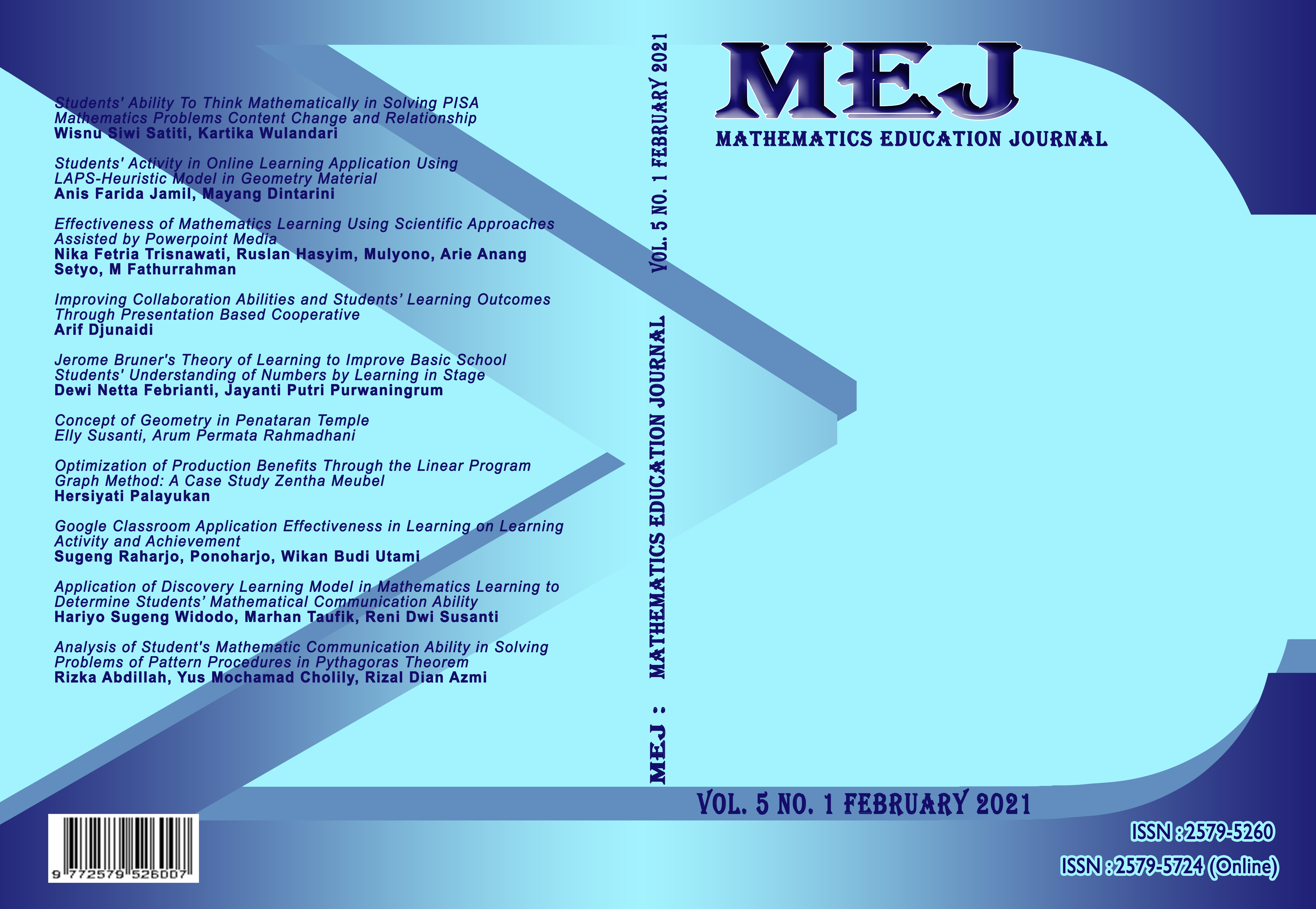Application of Discovery Learning Model in Mathematics Learning to Determine Students’ Mathematical Communication Ability
DOI:
https://doi.org/10.22219/mej.v5i1.16008Abstract
This research aimed to describe the application of the discovery learning model in mathematics learning and to describe students' mathematical communication skills both orally and in writing. The approach to this research is a qualitative approach, while the type of research used is descriptive. This research was conducted with the subject of class VIII C students in the 2019/2020 school year. The data collection techniques used in this study were observation to determine students 'mathematical communication skills orally and tests to determine students' written communication skills. The instruments used in this study were the observation sheet of students' communication skills and the test in the form of description questions. Based on the results obtained, it shows that the application of the discovery learning model in this study can be said to be quite good but the results are less than optimal and there are several obstacles experienced during learning activities using the discovery learning model. Meanwhile, the level of students' mathematical communication skills is quite good with a percentage of 56% for oral and 59.48% for written.
Downloads
References
Apriandinata, I. (2016). Penerapan Metode Discovery Learning untuk Meningkatkan Kemampuan Pemecahan Masalah Dan Komunikasi Matematik serta Dampaknya Terhadap Kemandirian Belajar Siswa SMA. Universitas Pasundan.
Halimatussadiah, A., & Halimah, L. (2017). Efektivitas Pembelajaran Metode Discovery Learning Terhadap Kemampuan Kounikasi Matematis. 5(1), 35–43.
Hartono, R. (2013). Ragam Model Mengajar yang Mudah Diterima Murid. Yogjakarta: DIVA Press.
Helmiati. (2013). Model Pembelajaran. Yogyakarta: Aswaja Pressindo.
Heryani, Y., & Setialesmana, D. (2017). Penggunaan Model Discovery Learning terhadap Peningkatkan Kemampuan Koneksi dan Komunikasi Matematik. Jurnal Pendidikan Matematika, 8, 43–52.
Hunaepi, Samsuri, T., & Afrilyana, M. (2014). Model Pembelajaran Langsung Teori dan Praktik. Mataram: Duta Pustaka Ilmu.
Kodirun, Busnawir, & Viktor, E. B. (2016). Penerapan Model Pembelajaran Discovery Learning Berbasis Lesson Study Dalam Upaya Peningkatan Kemampuan Komunikasi Matematik Siswa Kelas X Mipa-3 Sma Negeri 5 Kendari. 7, 93–104.
Mawaddah, S., & Maryanti, R. (2016). Kemampuan Pemahaman Konsep Matematis Siswa SMP dalam Pembelajaran Menggunakan Model Penemuan Terbimbing (Discovery Learning). EDU-MAT: Jurnal Pendidikan Matematika, 4(1), 76–85. https://doi.org/10.20527/edumat.v4i1.2292
Mufidah, L., Effendi, D., & Purwanti, T. T. (2013). Penerapan Model Pembelajaran Kooperatif Tipe Tps Untuk Meningkatkan Aktivitas Belajar Siswa Pada Pokok Bahasan Matriks. Jurnal Pendidikan Matematika, 1(1), 117–125.
Nazikha, F. N. (2016). Analisis Kemampuan Komunikasi Matematis Berdasarkan Self - Esteem Siswa Kelas Vii Pada Pembelajaran Matematika. Universitas Negeri Semarang.
Nurdyansyah, & Fahyuni, E. F. (2016). Inovasi Model. Sidoarjo: Nizamial Learning Center.
Nurgazali, F. (2018). Model Discovery Learning Dalam Pembelajaran Matematika. Model Discovery Learning Dalam Pembelajaran Biologi, (September), 18–20.
Pane, A., & Dasopang, M. D. (2017). Belajar Dan Pembelajaran. FITRAH:Jurnal Kajian Ilmu-Ilmu Keislaman, 3(2), 333. https://doi.org/10.24952/fitrah.v3i2.945
Prestika, I., Saragih, S., & Yuanita, P. (2018). Self Confidence Dalam Pembelajaran. Seminar Nasional Pendidikan Matematika FKIP UIR, (2), 29–30.
Qodariyah, L., & Hendriana, H. (2015). Mengembangkan Kemampuan Komunikasi Dan Disposisi Matematik Siswa Smp Melalui Discovery Learning. Edusentris, 2(3), 241. https://doi.org/10.17509/edusentris.v2i3.177
Sari, L. K., Noer, S. H., & Bharata, H. (2016). Pengaruh Model Pembelajaran Discovery Terhadap Peningkatan Kemampuan Komunikasi Matematis Dan Self Confidence. Jurnal Pendidikan Matematika Universitas Lampung.
Siregar, N. F. (2016). Pemahaman Dan Komunikasi Matematis Dalam Pembelajaran Matematika Realistik. Jurnal Logaritma, IV(01), 17–36.
Supriyanto, B. (2014). Penerapan Discovery Learning untuk Meningkatkan Hasil Belajar Siswa Kelas VI B Mata Pelajaran Matematika Pokok Bahasan Keliling dan Luas Lingkaran Di SDN Tanggul Wetan 02 Kecamatann Tanggul Kabupaten Jember. 3, 165–174.
Widiatmika, I. M., Suharta, I. G. P., & Suryawan, I. P. P. (2019). Meningkatkan Kemampuan Komunikasi Matematis Siswa Melalui Penerapan Creative Problem Solving. Jurnal Pendidikan Matematika Undiksha, 10(2), 1. https://doi.org/10.23887/jjpm.v10i2.19905
Widyasmoro, K. N. (2015). Peningkatan Komunikasi Matematis Siswa Melalui Strategi Discovery Learning Pada Siswa Kelas VII A Semester Gasal SMP Pancasila 13 Paranggupito Tahun 2015/2016. Universitas Muhammadiyah Surakarta.
Downloads
Published
Versions
- 2021-03-19 (2)
- 2021-03-18 (1)
Issue
Section
License
Copyright (c) 2021 Hariyo Sugeng Widodo

This work is licensed under a Creative Commons Attribution-ShareAlike 4.0 International License.
Authors who publish with MEJ (Mathematics Education Journal) agree to the following terms:
For all articles published in MEJ, copyright is retained by the authors. Authors give permission to the publisher to announce the work with conditions. When the manuscript is accepted for publication, the authors agree to automatic transfer of the publishing right to the publisher.
Authors retain copyright and grant the journal right of first publication with the work simultaneously licensed under a Creative Commons Attribution-ShareAlike 4.0 International License that allows others to share the work with an acknowledgment of the work's authorship and initial publication in this journal.
Authors are able to enter into separate, additional contractual arrangements for the non-exclusive distribution of the journal's published version of the work (e.g., post it to an institutional repository or publish it in a book), with an acknowledgment of its initial publication in this journal.
Authors are permitted and encouraged to post their work online (e.g., in institutional repositories or on their website) prior to and during the submission process, as it can lead to productive exchanges, as well as earlier and greater citation of published work (See The Effect of Open Access).

This work is licensed under a Creative Commons Attribution-ShareAlike 4.0 International License.










